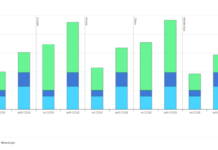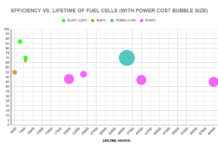by Debra Fiakas CFA
Before the open of the first trading day of 2015, fuel cell developer Ballard Power Systems (BLDP: Nasdaq) announced the termination of technology licenses to Azure Hydrogen, which was to have been Ballard’s introduction to the China market. The license agreements covered the sale of Ballard’s bus power module and telecom backup power system. Ballard has charged Azure with breaching the agreements and the two companies have apparently not been able to come to alternative terms.
Azure had made sales in the China and not all of the equipment had been paid. Termination of the relationship casts some doubt on outstanding accounts receivable totaling $4.5 million. Apparently the skepticism was sufficient to cause Ballard’s accountants to write off the full $4.5 million.
While waiting to see that bit of bad news in the year-end financial report, investors can mull over the other consequence of the divorce from Azure – reduced revenue expectations. Management reduced guidance for the December 2014 quarter by $3.0 million, but deferred a discussion of the impact on 2015 until late February when they were already planning to provide guidance for the upcoming year.
Most likely this is a temporary hiccup. There are plenty of other players in China that would be capable of penetrating that market with fuel cells for both transportation and stationary applications. Ballard should have plenty of options to forge another relationship. What will be challenging is finding a credit worthy counterpart. Ballard had required a $1 million upfront payment from Azure at the signing of the first license agreement in May 2013. Shareholders might have thought that would have been sufficient to secure Azure’s business integrity.
Some investors might think the bad news provides an opportunity to accumulate shares of Ballard at an economical price. BLDP gapped down in the first hour of trading following the announcement, giving up some of the gains the stock had made in the previous week. The stock had been on a steady decline over the past several months, but the supply seemed to have been turned off with the expiration of tax-loss sales opportunities.
Ballard has managed to build revenue up to $70.4 million in the most recently reported twelve months. The consensus among the half dozen analysts who have published estimates for Ballard is suggests the company was expected to report $73.4 million for the year. With the termination of the Azure relationship and the elimination of that business in the fourth quarter, it appears the company is poised to report about $70 million in sales for the year. That would suggest flat results compared to the prior year, but Ballard also has the write-off of the uncollectible accounts receivable. Thus 2014 could be a down year in terms of sales.
Investors can expect a significant net loss in the year. The trailing twelve month loss was $13 million through the end of September 2014. The consensus estimates suggest few if anyone expects the company to breakeven anytime soon. Ballard has a $32.7 million cash hoard to tide the company over. At the present cash usage rate Ballard has about two years to ‘fire it’s engines’. That might offer some encouragement to value investors who see the recent dip in price to pick up shares.
The implications of the license agreement termination came on a day most investors were likely taking the day off for an extended recovery from the New Year celebrations. It is likely that there will be further reaction registered in the stock price with the rest of investors return from holiday merry making. Then the year-end 2014 report at the end of February could evoke even further reaction as investors can see the bad news in numbers.
Ballard stubbed its toe in the final days in 2014 and waited until the first day of the New Year to give investors the good news. Putting out the press release one day after New Year’s Day is not likely to shield Ballard from the harsh realities of the equity market. Even more compelling buying opportunities might be ahead.
Debra Fiakas is the Managing Director of Crystal Equity Research, an alternative research resource on small capitalization companies in selected industries.
Neither the author of the Small Cap Strategist web log, Crystal Equity Research nor its affiliates have a beneficial interest in the companies mentioned herein.








